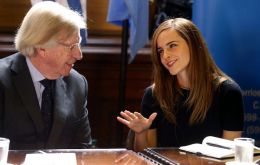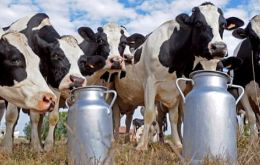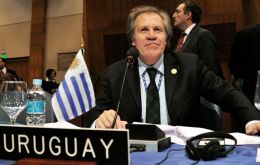MercoPress. South Atlantic News Agency
Uruguay
-
Wednesday, September 24th 2014 - 16:35 UTC
FIFA proposes three minute stoppage if a player suffers a suspected concussion

FIFA says its executive committee will this week discuss a proposal to introduce a three-minute stoppage if a player suffers a suspected concussion. Michel D'Hooghe, head of FIFA’s medical committee, recommended the new rules for the treatment of head injuries following a series of incidents in recent months that have sparked criticism of FIFA.
-
Monday, September 22nd 2014 - 04:16 UTC
Mujica brags on foreign policy; Latam ready to play a larger role in peace issues, Europe has lost clout

Uruguay's president Jose Mujica said the latest world events show that Europe 'has lost clout' in global affairs, and has lost strength as 'peace mediator', and this role could be “much better performed by Latin America”.
-
Thursday, September 18th 2014 - 06:08 UTC
Emma Watson draws hundreds of young fans in Montevideo during the UN goodwill visit

British actress Emma Watson drew hundreds of young fans on Wednesday as she visited Uruguay's Legislative Palace to promote women's participation in politics in her new role as a UN goodwill ambassador.
-
Thursday, September 18th 2014 - 05:14 UTC
Philip Morris determined to make its legal battle over cigarette labeling with Uruguay, a lesson for other countries

Whether you’re a Marlboro man or a Benson & Hedges smoker, if you pick up a pack in the South American nation you will be greeted by an image of decaying teeth, premature babies, horrific hospital scenes or some other terrifying scenario.
-
Tuesday, September 16th 2014 - 05:25 UTC
Uruguay's economy expands 3.7% during the second quarter over a year ago

Confirming ten years of sustained expansion the Uruguayan economy advanced 2% in the second quarter over the first quarter and 3.7% over the same period a year ago, according to the latest reports from the Central bank.
-
Friday, September 12th 2014 - 01:39 UTC
Singapore Olam will invest 80m in dairy processing facility in Uruguay

Singapore based Olam International's wholly-owned subsidiary New Zealand Farming Systems Uruguay will be investing 80 million dollars to establish a new dairy processing facility in Uruguay.
-
Thursday, September 11th 2014 - 04:48 UTC
Judge Griesa will wait for appeals court ruling before acting on holdouts' Citibank subpoena

US district judge Thomas Griesa has said he would wait for a decision on a pending appeal before ordering Citigroup to comply with a subpoena served by holdout investors seeking details of any threats from Argentina to process payments the court had blocked.
-
Tuesday, September 9th 2014 - 04:57 UTC
Opposition parties five points ahead of Uruguay's ruling coalition for October election

With less than fifty days to national elections when Uruguayans will vote for president and a new parliament (26 October), public opinion polls indicate that the ruling coalition until a few months ago the undisputed winner, faces a runoff and whoever wins will have to rule with a divided legislative.
-
Tuesday, September 9th 2014 - 04:46 UTC
Uruguay opens second pulp mill with annual production capacity of 1.45 million tons

Uruguay officially inaugurated on Monday a second pulp mill, Montes del Plata, on the River Plate, belonging to Chile's Arauco and Swedish-Finnish Stora Enso, which is considered the largest single investment in the country and will have an annual production of 1.3 million tons.
-
Monday, September 8th 2014 - 07:25 UTC
Belize supports Uruguay's Almagro for OAS Secretary General next year

Belize says it will support Uruguay for the position of secretary general of the Organization of American States (OAS) and downplayed any suggestion that its non-support for the Guatemalan candidate was linked to the ongoing territorial dispute between the two countries.
